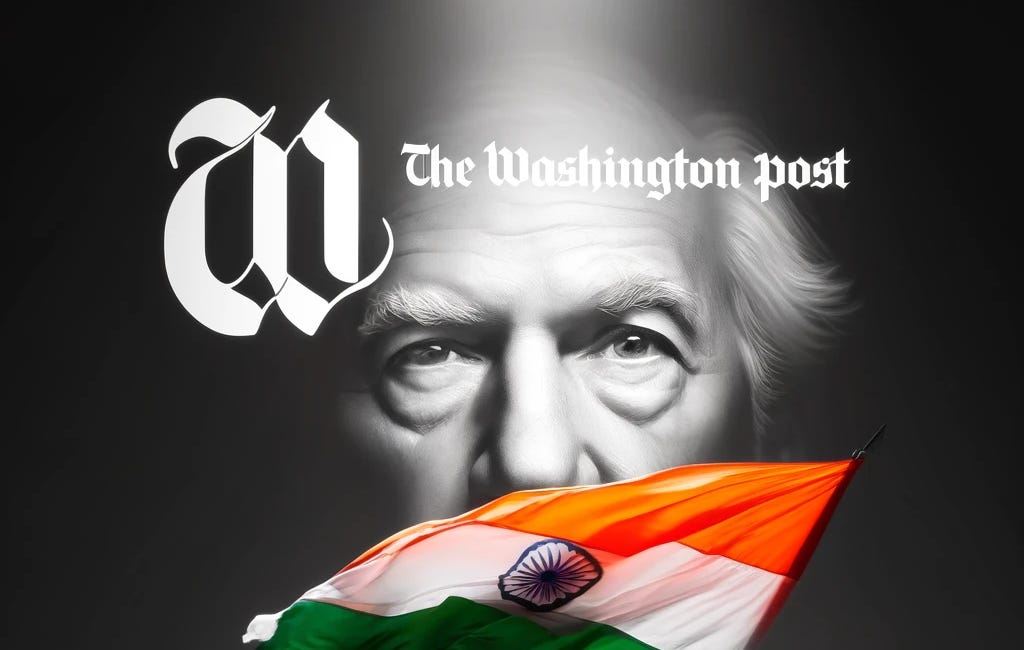India No Longer a Soft State: A Balanced Perspective on India's Security Policies and PM Modi's Political Rhetoric
We Rebut and Challenge a Biased and Motivated Article by an American Journalist Who Appears to Have Misused US Congressional Hearings to Escalate Criticisms Against India
Assessment of Pieter Friedrich's Article
The recent article by Pieter Friedrich, provocatively and sensationally captioned, Modi's "New India" Comes Into Foreign Critics' Homes To Kill, presents a highly critical view of Indian Prime Minister Narendra Modi and his administration, focusing on accusations of transnational repression and authoritarian practices. Pieter Friedrich is not merely an author expressing an opinion but an active participant in Congressional events and a prominent advocate for human rights issues related to India. Friedrich is a US-based independent journalist and author specializing in the analysis of current and historical affairs in South Asia, with a particular focus on India's Hindu nationalist movement and its influence on sociopolitical events in America.
Credentials of the Author
Pieter Friedrich is a US-based independent journalist and author with a notable focus on human rights issues related to South Asia. He has delivered remarks at a Congressional briefing on the wrongful incarceration of Indian Muslim activist Umar Khalid on October 19, 2023, confirming his direct involvement in Congressional events. Friedrich has actively participated in activism, including a nine-day hunger strike to draw attention to violence against Christians in Manipur, India, urging U.S. Representative Ro Khanna to address the issue on the House floor. His work has earned recognition in various publications, and he has spoken alongside parliamentarians from Australia, Germany, and the UK. Additionally, Friedrich has lectured at several prestigious universities, including Columbia University, Stanford University, and UC Berkeley. His advocacy primarily focuses on human rights issues arising from various forms of nationalism and supremacism, particularly state-sponsored atrocities, foreign interference, and transnational repression.
Here's a critical assessment of the article, examining both its content and the broader context:
Strengths of the Article
Detailed Accusations: The article purportdely provides specific examples of alleged transnational repression, such as the assassination of Hardeep Singh Nijjar in Canada and the plot against Gurpatwant Singh Pannun in the US. These incidents are supported by references to investigations and statements from Western security officials.
Highlighting Human Rights Issues: Friedrich's piece underscores pereceived human rights concerns, aligning with reports from organizations like Human Rights Watch and the US Commission on International Religious Freedom (USCIRF). It raises awareness about the potential misuse of state power against dissenters, both domestically and internationally.
Call to Action: The article doesn't just present problems but also suggests what he regards as solutions, urging US lawmakers to take concrete steps against transnational repression by co-sponsoring specific legislation and speaking out against such practices.
Weaknesses and Criticisms
Potential Bias and Lack of Balance: Friedrich's article is decidedly one-sided, offering a very critical perspective on Modi and his administration without presenting counterarguments or the Indian government's perspective. This lack of balance can lead to questions about the objectivity and fairness of the analysis.
Reliance on Anecdotal Evidence: While the article includes some references to investigations and official statements, it also relies heavily on anecdotal evidence and personal experiences. For instance, Friedrich’s own perspectives of harassment and repression might not be universally representative and could be seen as subjective.
Extrapolation and Speculation: Some of the article's claims, such as Modi's administration planning further assassinations or interference in US elections, are totally speculative. While these concerns might be valid from his stand-point, they are not substantiated with concrete evidence, making them appear more as conjecture than fact.
Overemphasis on Modi’s Statements: The article heavily focuses on Modi's campaign rhetoric, mistranslating as well as misinterpreting it as direct threats of international violence. While political rhetoric can be concerning, there is a need to distinguish between statements made made in idiomatic Hindi for domestic political campaigning and actual state policies.
Contextual Considerations
Geopolitical Dynamics: The relationship between India and the US is complex, involving strategic, economic, and geopolitical factors. The article doesn't sufficiently explore these dynamics, which can influence how the US responds to human rights concerns in India.
Internal Indian Politics: Modi’s popularity in India, particularly among his supporters, is often linked to his nationalist rhetoric and promises of strong leadership. Understanding the domestic political context is crucial for a nuanced assessment of his statements and policies.
Media and Information Warfare: In the age of information warfare, disinformation and propaganda are significant issues. Both supporters and critics of Modi have been known to engage in such practices. The article could benefit from a deeper analysis of these aspects to provide a more rounded perspective.
Context of Modi's Statement
Indian Prime Minister Narendra Modi, while campaigning for re-election— as per the author Pieter Friedrich— declared: “Today, even India’s enemies know: This is Modi, this is the New India. This New India,” the PM reportedly said, “comes into your home to kill you.” The translation by the author might be correct in strict literal terms, but given the context of his remarks made in a public meeting during the Lok Sabha election campaign, the author has erred in translating the original Hindi sentence "Ghar ghus ke mareinge" (घर घुस के मारेंगे). Here, "mareinge" cannot be accurately translated as "killed"; at best, it would be translated as "beat" as commonly understood. This reflects the inherent and inveterate bias of the author Friedrich.
Misinterpretation of Political Rhetoric
Given that other Western nations like the USA and Israel often cross international boundaries to literally bombard and kill, even at the huge collateral cost of innocent civilian casualties, this political rhetoric cannot be translated or interpreted to mean that Prime Minister Modi, or India as a sovereign country, will enter the homes of enemies—whether within India or abroad—or critics to kill, assassinate, or liquidate them. It is simply a strong message that India is no longer a “soft state,” a label it had borne for decades by domestic and international experts. A foreign journalist, close to the US congressional circles, appears to be playing to the gallery to paint an alarming picture through his article, which is not only skewed but also heavily prejudiced.
Diplomatic and Political Messaging
PM Modi's statement should be seen as a strong political and diplomatic message to Pakistan, whose long history of attempting to destabilize India through numerous attacks is well-known and documented. This is also a message to the Indian electorate and the masses that India will not be a passive and mute spectator to such cross-border acts of terrorism. The protection of the country’s territorial integrity and national security is the solemn constitutional function of the central government. India has previously exhibited this prowess in the Balakot strikes of 2019, demonstrating its capability and willingness to take decisive action against threats by targeting terrorist training camps inside Pakistan, not just in Pakistan-Occupied Kashmir (POK).
Allegations of State-Sponsored Assassinations by ex-CIA Agent
Allegations of India's involvement in state-sponsored assassinations and the planned but thwarted assassination of pro-Khalistan Sikh leaders in Canada and the USA are public. I have also written an article rebutting the so-called revelations of India's involvement as a sovereign state in neutralising, within Pakistan, anti-India militants attacking Jammu and Kashmir and known Khalistani ideologues like Paramjit Panjwar, who had been granted sanctuary in Pakistan. This was in the context of a YouTube video of an ex-CIA agent, Sarah Adams— whose designation while in the CIA was that of a ‘Targeting Officer’— that went semi-viral in India as well as abroad. Although their capacity of these isolated individuals to cause credible damage inside Indian Punjab had been severely attenuated, India's actions pro-active, preventive and preemptive were aimed at ensuring national security, the ex-CIA agent had insinuated.
Investigative Articles in WaPo and My Response
Another instance was The Washington Post's detailed investigative article that named India's National Security Adviser and the immediate previous R&W Chief, Samant Kumar Goel, an ex-IPS officer from the Punjab cadre and my batchmate. Strongly, rejecting the one-sided version WaPo, I had averred that such reports need to be critically evaluated in the context of India's security and diplomatic strategies rather than being accepted at face value.
Upholding Freedom of Speech
Given the fundamental right to freedom of speech, government agencies—whether of the central government or the respective state governments—should refrain from registering FIRs under stringent provisions of the law merely for tweets, TV interviews, or YouTube videos against political opponents, professional journalists, and proponents of civil society NGOs, whether domestic or international. India should not just be the largest democracy in the world but also a model one, where political dissent is not penalised, as it is done in a totalitarian state.
Conclusion
In summary, the article by Pieter Friedrich should not be given more importance than it deserves. It is crucial to read a balanced perspective, such as my articles1, to understand the complete picture, given that the mainstream Indian media is virtually silent on such issues and does not carry any analytical pieces beyond reporting the verbatim official denials of India’s Ministry of External Affairs2. Friedrich's narrative seems to be heavily biased and aims to alarm rather than inform, lacking the necessary context and understanding of India's security policies and political rhetoric.
While Friedrich's article raises important and serious concerns about human rights and state repression, its one-sided nature, reliance on anecdotal evidence, and speculative elements can undermine its credibility. A more balanced approach, incorporating multiple perspectives and a broader analysis of geopolitical and domestic contexts, would strengthen the argument and provide readers with a more comprehensive understanding of the issues at hand.
Former CIA Agent Reveals: India—from a 'Soft State' to Preemptive Strikes in Pak Heartland
India’s Assertive Stance Against Terrorism
Washington Post's Speculative Stance: When Journalism Crosses into Conjecture
Unfounded Allegations and Sensationalism






